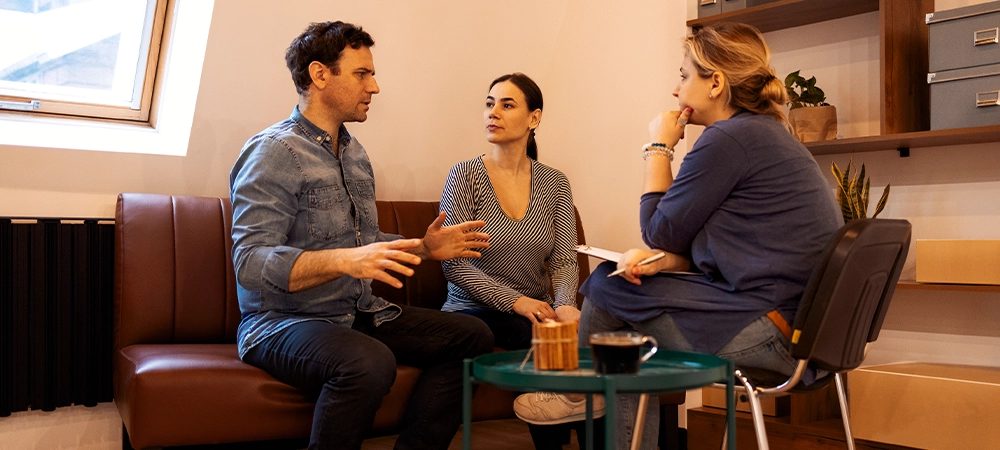CBT Self-Reflection Questions for Couples
Relationships often mirror our inner thoughts and emotions. When communication breaks down or emotions run high, cognitive behavioural therapy (CBT) helps couples slow down, examine their reactions, and understand the patterns behind them.
At Rosen Couples Counselling, CBT is used to uncover how certain thought habits (like jumping to conclusions, assuming intentions, or replaying old hurts) can quietly shape a couple’s dynamic. Once these patterns are recognized, change becomes possible. Partners begin to replace automatic reactions with mindful responses that invite understanding instead of conflict.
Related Article: 7 CBT Strategies Every Couple Should Try
The Power of Reflection in Relationships
Many couples find that arguments repeat the same themes: “You never listen,” “You don’t care,” or “You always walk away.” Reflection interrupts this loop. It allows each partner to ask: What am I really reacting to right now?
Self-reflection doesn’t mean overthinking every word. It means noticing emotions before they take control. It helps partners shift from blaming each other to examining what’s happening within themselves. This awareness creates empathy—the quiet foundation of every healthy relationship.
Communication Check: Understanding How You Speak and Listen
Many couples seek therapy after communication issues start turning simple conversations into sources of tension and misunderstanding.
Most relationship challenges trace back to how partners communicate. In therapy, couples often discover that it’s not the topic of conversation that causes tension but the way it’s delivered or heard.
Before diving into problem-solving, pause and ask:
- What happens in my body when I feel unheard—tight chest, raised voice, silence?
- When my partner speaks, do I listen to understand or to prepare my defence?
- How often do I assume meaning without confirming what was actually said?
These moments of awareness change how couples talk. Instead of reacting from frustration, they learn to speak with curiosity and compassion.
Related Article: How to Improve Listening with Couples Therapy
Noticing Thought Patterns That Shape Your Reactions
CBT encourages partners to recognize the link between thoughts and emotions. For example, the thought “They don’t care about me” can instantly spark anger or withdrawal. The key is to question these assumptions before they take hold.
Try reflecting on:
- What beliefs do I carry about love, loyalty, or fairness that might influence my expectations?
- Do I interpret disagreement as rejection?
- How often do I assume the worst before asking for clarification?
Recognizing these thought loops helps couples replace automatic negativity with more balanced, realistic thinking. Over time, communication becomes calmer and more honest.
Emotional Triggers and How to Work Through Them
Every couple faces moments that hit a nerve—a tone of voice, a forgotten task, a sigh that feels dismissive. These reactions often come from deeper emotions such as fear, guilt, or past pain. CBT helps partners identify and name these triggers instead of acting them out.
CBT questions to ask yourself:
- What situations make me feel dismissed or unimportant?
- How do I react when I sense tension building—withdrawal, sarcasm, anger?
- What emotion lies underneath that reaction?
When couples understand each other’s emotional triggers, they can respond with empathy rather than defensiveness. The goal isn’t to avoid all conflict but to move through it together without damaging the connection.
Related Article: 5 Relationship Issues CBT Can Solve
Rebuilding Trust Through Honest Reflection
Trust isn’t only about fidelity; it’s about reliability, honesty, and emotional safety. Rebuilding it often requires gentle but persistent honesty.
Partners can explore:
- What helps me feel safe enough to be open about my fears or mistakes?
- How do I show my partner that I value their trust?
- What needs to change so that both of us can feel secure again?
In CBT, small, consistent actions like keeping promises or validating emotions rebuild trust over time. It’s about choosing reassurance over avoidance.

Setting Shared Goals and Moving Forward
Once awareness grows, couples can begin setting small, practical goals. A goal might be “Pause for ten seconds before replying during an argument,” or “End each day by sharing one thing I appreciated.” These may seem simple, but consistency turns them into lasting change.
At Rosen Couples Counselling, therapists help couples track these shifts through structured reflection exercises. Over time, progress feels less like fixing a problem and more like rediscovering teamwork.
Bringing Reflection Into Everyday Life
Self-reflection doesn’t have to stay within therapy walls. Many couples find it helpful to do a brief weekly check-in—five minutes to ask: “How are we doing?” or “What’s been harder for you this week?”
Writing down insights or sharing them during calm moments keeps communication steady. The goal is to make reflection part of daily life, not a chore but a shared habit that keeps the relationship emotionally clean and connected.
Rediscover Connection Through Understanding
CBT-inspired reflection isn’t about analyzing every argument; it’s about learning how to see your partner with fresh eyes. The more awareness you build, the easier it becomes to respond with care instead of reflex.
If you and your partner are ready to strengthen your connection, Rosen Couples Counselling offers compassionate, evidence-based CBT sessions that turn reflection into real change. Evening and weekend appointments make it easy to begin at your own pace.
Book a CBT couples session with Rosen Counselling today and start turning reflection into real progress together.

Frequently Asked Questions
How does CBT differ from traditional couples counselling?
CBT focuses on identifying and changing unhelpful thought patterns that influence emotions and behaviour. While traditional couples counselling may explore past experiences or emotional history, CBT emphasizes the present, helping couples recognize triggers, challenge assumptions, and communicate with clarity. It’s goal-oriented, structured, and rooted in practical skills.
Can CBT help if one partner is hesitant about therapy?
Yes, as long as there’s a willingness to try. A skilled therapist can create a space where both partners feel comfortable expressing concerns at their own pace. Early sessions often focus on building trust and demonstrating small, meaningful improvements that encourage continued participation.
What kinds of relationship issues respond best to CBT?
CBT is effective for communication breakdowns, recurring arguments, jealousy, trust issues, and emotional distance. It’s also helpful when one or both partners struggle with anxiety, depression, or stress that spills into the relationship. By addressing both individual and shared thought patterns, CBT strengthens understanding on multiple levels.
How long does CBT for couples usually take?
Each couple’s timeline is unique, but most begin noticing progress within 6 to 12 sessions. Frequency often starts weekly and later shifts to bi-weekly as new habits take hold. The goal isn’t endless therapy; it’s to build the skills needed to manage challenges independently.
Do couples need to complete reflection questions together?
Not always. Some questions are best explored individually first, especially if emotions are sensitive or still raw. Once partners have reflected privately, sharing answers during a calm conversation or therapy session can lead to deeper mutual understanding and empathy.
What if reflection brings up unresolved anger or resentment?
That’s normal. Reflection can reveal emotions that have been buried for a long time. A therapist helps couples process these feelings safely, ensuring discussions don’t turn into blame. The aim is to move from reaction to repair, turning old pain into insight.
Can CBT work for couples who are considering separation?
Absolutely. Even when separation feels likely, CBT can provide clarity and structure for communication. Some couples discover ways to rebuild connection, while others part with mutual respect and less conflict. Either outcome offers emotional closure and healthier coping skills.
How does a therapist use CBT during sessions?
During therapy, the therapist might guide partners through thought-tracking exercises, emotional mapping, or communication practice. For example, one session may focus on identifying triggers; another might involve role-playing healthy conflict responses. Each activity builds awareness and equips couples with tools to use outside the session.
What should couples expect between sessions?
Between appointments, couples often receive short reflection prompts or communication exercises. These tasks help reinforce what was discussed in therapy. Consistent practice, such as journaling reactions after arguments or noticing moments of gratitude, keeps progress steady and meaningful.




